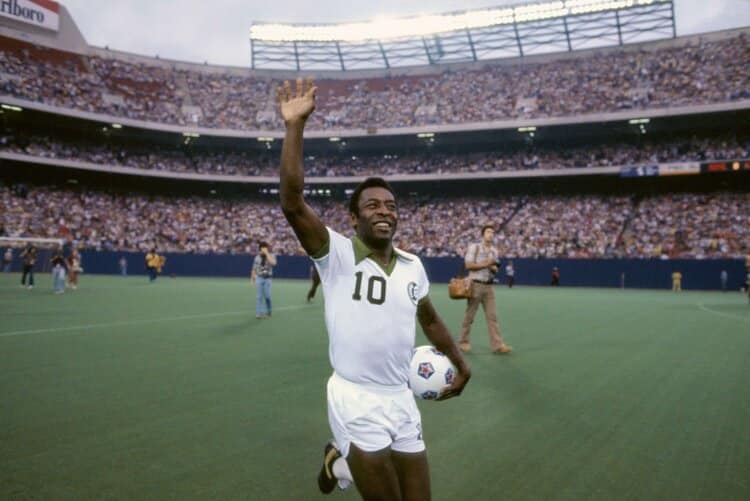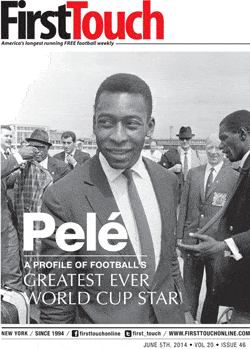Pele, the King Of Football is dead. The three-time World Cup winner died of complications from colon cancer. He was surrounded by his family. Here is Dave Bowler’s profile of Pele from 2014.

When it comes to soccer legends, where else do you start but Pele. The greatest of soccer legends bar none. Brazil are customarily seen as the greatest footballing nation on earth. Routinely at each World Cup, whatever their form, whoever is in the team, they are installed as favourites, the team to beat, certainly the team to watch. While they continue to have their share of success, they are not the invincibles that the pre tournament talk would suggest, not any longer, and nor do they always play with the invention, the verve, the swagger that was theirs in days of yore.
By Dave Bowler
The Brazilian reputation, in large part, rests on what they achieved in the years between 1958 and 1970 and the way in which they did it. Emblematic of that glorious dozen years was one man – Pele.
In his prime, there was never any question that he was the greatest player in the world, and over a sustained period of time. Even today, near 40 years after he hung up the boots, he still gets the nod from many shrewd judges as the greatest of all time. Certainly no other player of any generation conjures up the same number of images, of thoughts, of smiles as the great Brazilian does.
PELE STARS AT 1958 WORLD CUP
He came to the world’s attention in 1958 when Brazil gave the world a new vision of what football might be about, building upon and eclipsing the style of the great Hungarian side of the early 1950s. Pele was an unknown as the team arrived in Sweden, just 17 years old, but his countrymen knew all about him. Along with the mercurial Garrincha, he was the icing on the top of an already rich cake, the two of them joining forces late on in that World Cup to lay waste to the competition.
Blessed with blistering pace, Pele had a command and control of the football that was superhuman. Let’s recall that he did not play with the lightweight piece of plastic that today’s giants can bend to their will. Pele was faced with the cased leather ball, an altogether different proposition when it came to bending and shaping. But he dictated to it as if it were an extension of his body, announcing himself in the final win over Sweden.
Brazil won 5-2 in the end, but it was their third goal that clinched matters, not just in terms of the match but in immortality too. Jumping to collect a lob into the box on his chest, in one movement he turned and lobbed the ball over the covering defender. With him taken out of the game, he waited for the ball to drop, utterly unflustered, before drilling it right footed past the ‘keeper.
PELE INJURED AT 1962 WORLD CUP
By the time the world reconvened for the 1962 championships, we were waiting to see how the 21 year old Pele had matured, but the world would be disappointed for he was injured in Brazil’s second game of the competition and sat the rest of it out as Garrincha cemented his place at the head of world football.
It was Pele’s achievements on the domestic front that kept him in the forefront of the world’s mind, Santos of Brazil cultivating a worldwide reputation akin to that of the Harlem Globetrotters, heading to Europe, being caught on TV, Pele’s extraordinary goals being beamed across the world. If anything, by 1966 he was even more feared by the rest of the world and, as European football readied itself for 1966, it became clear that if Brazil were to be denied a hat-trick of titles, Pele had to be stopped. These were darker times and it was clear that if you could not stop him by fair means, then foul ones would have to do.
In the opening game, Pele scored from a free-kick but was kicked from pillar to post by the Bulgarians which meant he missed out on the second game against the Hungarians which Brazil lost. Still unfit, he was required to play in the third game as Brazil had to beat Portugal to go through to the knock-out stages. The film of that game shows Pele being hacked to pieces by Portugal, but having to carry on in an era where there were no substitutes. Portugal won as Pele limped away, vowing never to play at the World Cup again.
PELE BECOMES A LEGEND AT 1970 WORLD CUP
Fortunately by the time 1970 rolled around, he had changed his mind, enabling him and his team to present perhaps football’s finest hour. The competition presented on global television from Mexico, the players moving in shimmering colour for those few lucky enough to have a colour set, the vivid fluorescence of the Brazilian shirts and the extraordinary brilliance of the men in it captured the imagination like no team before or since.
Pele was at the heart of it, the memories of those days as clear now as at the time: trying to score from the kickoff, selling a keeper an outrageous dummy before skewing a short inches wide from an impossible angle, thumping in a header against Italy in the final before ending that game by having the vision to roll the ball to seemingly nobody, only for the watching world to find it was perfectly placed and weighted for Carlos Alberto to charge onto and score possibly the greatest goal of all time, certainly the one that packs the greatest emotional release.

PELE JOINS NEW YORK COSMOS
Thereafter, there were the years exploiting the Pele name, for the good of football, of himself, and of erectile dysfunction. He was the spearhead of the New York Cosmos, bringing soccer to the United States and capturing, albeit briefly, the attention of a nation resolute in its contempt for the world’s game.
In the end, Pele stands alone, a genius, an innovator, the right man in the right place, the right team at the right team to become the first global football superstar and a man to rival even Muhammad Ali as the greatest sportsman of his time.
Perhaps even more important, his greatest legacy, was that he gave the world the phrase ‘The Beautiful Game‘ to describe football, three little words that were the title of his autobiography. It is an aspiration that the romantics among us still require football to live up to.
